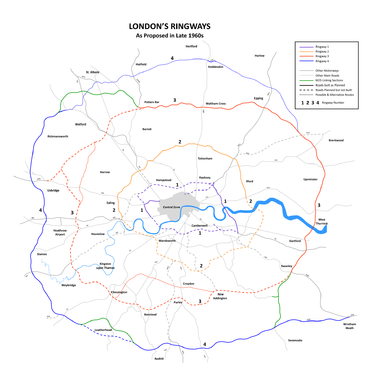
Homes before Roads
Encyclopedia

United Kingdom
The United Kingdom of Great Britain and Northern IrelandIn the United Kingdom and Dependencies, other languages have been officially recognised as legitimate autochthonous languages under the European Charter for Regional or Minority Languages...
initially formed in London
London
London is the capital city of :England and the :United Kingdom, the largest metropolitan area in the United Kingdom, and the largest urban zone in the European Union by most measures. Located on the River Thames, London has been a major settlement for two millennia, its history going back to its...
in 1970 to oppose plans to construct a system of four interlinked concentric motorways through and around London, known as Ringways
London Ringways
The London Ringways were a series of four ring roads planned in the 1960s to circle London at various distances from the city centre. They were part of a comprehensive scheme developed by the Greater London Council to alleviate traffic congestion on the city's road system by providing high speed...
. The name was subsequently used by other anti-motorway campaigns elsewhere in the country.
In London
Homes before Roads were active in campaigning against the Draft Greater London Development Plan containing the motorway proposals and in fighting it in the associated public inquiryPublic inquiry
A Tribunal of Inquiry is an official review of events or actions ordered by a government body in Common Law countries such as the United Kingdom, Ireland or Canada. Such a public inquiry differs from a Royal Commission in that a public inquiry accepts evidence and conducts its hearings in a more...
. The movement put up candidates in 80 of the 100 seats in the 1970 elections
Greater London Council election, 1970
The third election to the Greater London Council was held on 9 April 1970 and saw a Conservative victory with a reduced majority. In addition to the 100 councillors, there were sixteen Aldermen who divided 11 Conservative and 5 Labour, so that the Conservatives actually had 76 seats to 40 for...
to the Greater London Council
Greater London Council
The Greater London Council was the top-tier local government administrative body for Greater London from 1965 to 1986. It replaced the earlier London County Council which had covered a much smaller area...
. Although Homes Before Roads only received 2 per cent of the vote, the Labour Party in London, which had originally commissioned the motorway plans and supported them along with the Conservatives during the 1970 elections, subsequently adopted a policy opposing the scheme. As a result the plans were cancelled after Labour gained control of the Council in the 1973 GLC elections
Greater London Council election, 1973
The fourth election to the Greater London Council was held on April 12, 1973. Labour, benefiting both from the unpopularity of the Conservative GLC's transport policy and from the difficulties of the national Conservative government, won a very large majority of 58 seats to 32 for the...
, adopting policies in favour of public transport
Public transport
Public transport is a shared passenger transportation service which is available for use by the general public, as distinct from modes such as taxicab, car pooling or hired buses which are not shared by strangers without private arrangement.Public transport modes include buses, trolleybuses, trams...
and traffic management
Traffic management
Traffic management may refer to* Bandwidth management in computer networkingRoad traffic management in road transport* In combination with "policies", a black box of governmental or commercial policies...
instead, although by then several sections had already been built.
Elsewhere
Many of the movement's supporters went on to fight motorway proposals elsewhere in the country under the Homes before Roads banner, which received widespread public recognition due to the national debate that ensued during the high profile campaign in London. A core of around 150 people provided speakers, expert witnesses and organised media coverage.External links
- Motorways in central London: how public protest stopped construction BBC Learning Zone

